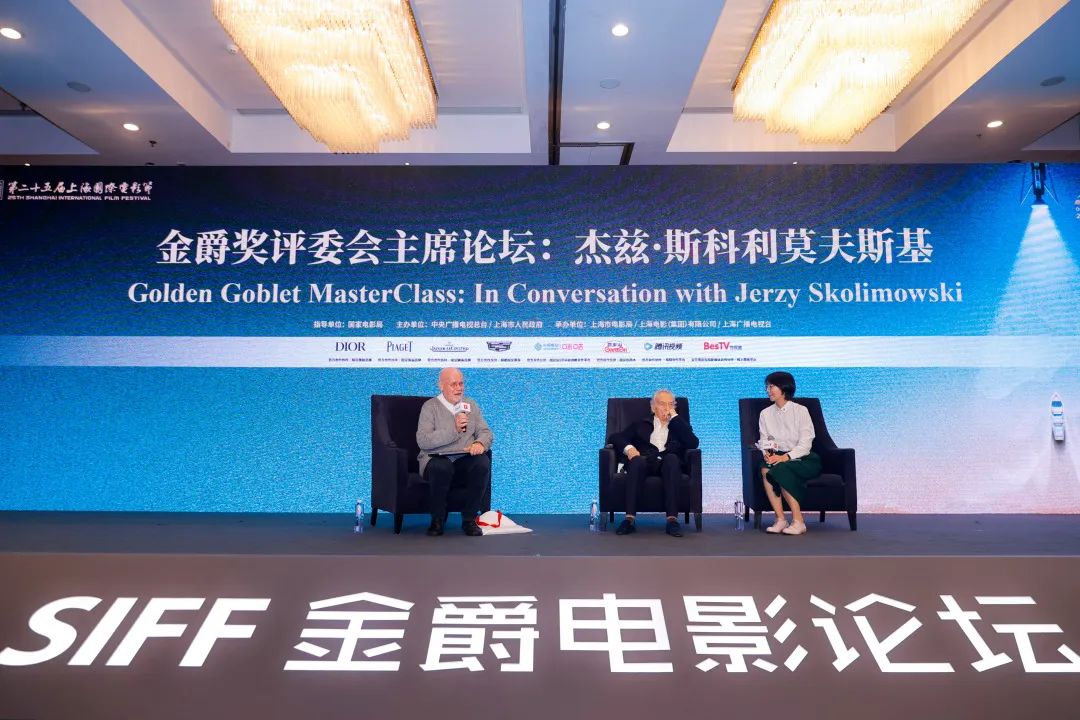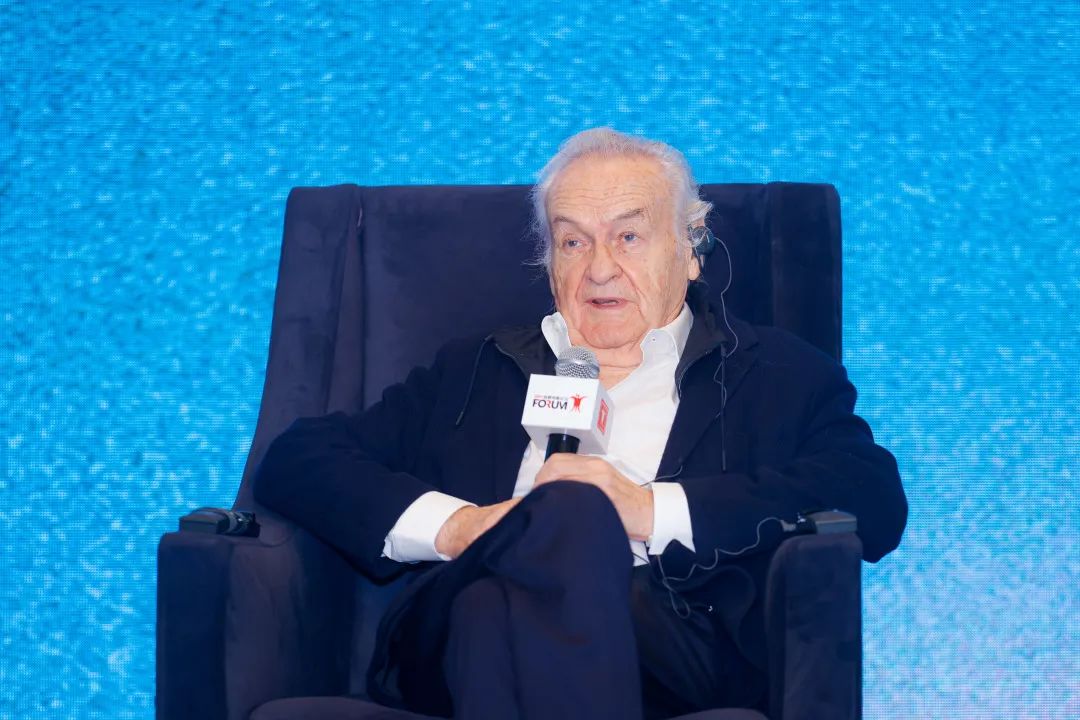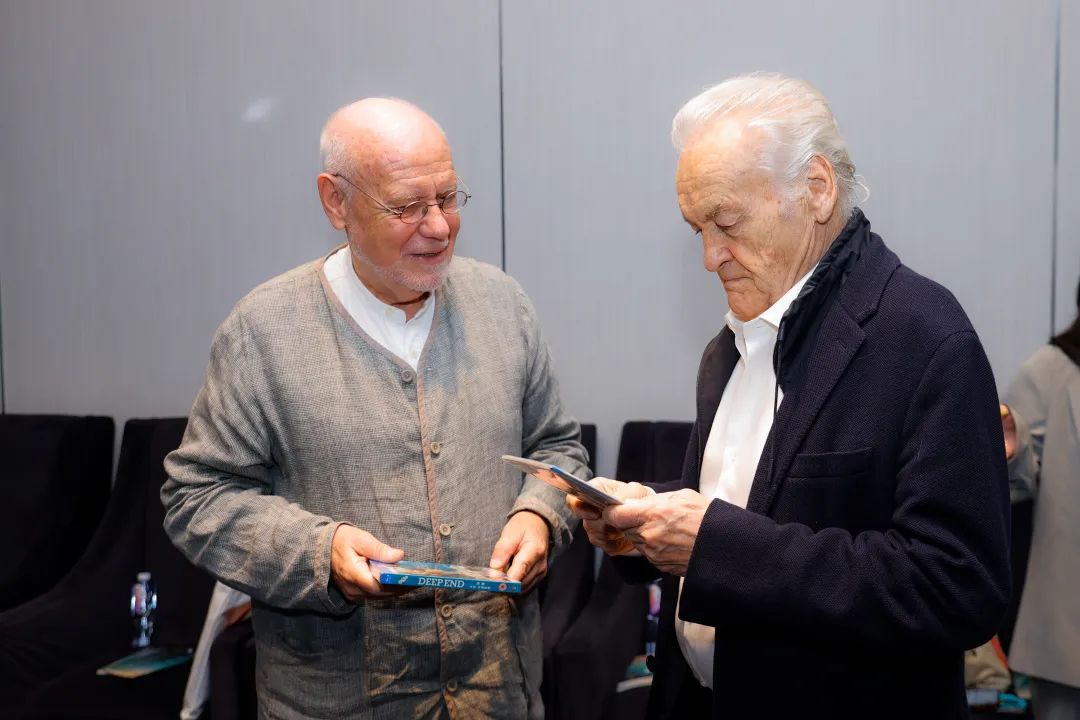SIFFORUM | Jerzy Skolimowski: I Am Still a Young Director
The film EO by Polish film director and SIFF Jury president, Jerzy Skolimowski, garnered a multitude of Chinese film enthusiasts who were unacquainted with his work but became enchanted with his unparalleled perspective and playful use of cinematography. Skolimowski had a 90-minute conversation with Marco Müller, Artistic Director of the Cinematic Art Research Center, Shanghai University, and a Distinguished Professor at Shanghai Film Academy, at the Golden Goblet MasterClass forum held at SIFF on June 14. They reminisced about Skolimowski’s initial foray into the film industry, discussed interesting anecdotes about his competition with New Wave filmmakers, and the reasons for his “retirement and re-entry” into the industry. His “impish charm” sparked constant laughter from the audience.

Why make films?
“Because I lost half of my boxing matches.”

Marco Müller often says to his students that the New Wave that defined cinema in the 1950s was not the so-called “French New Wave,”but should more accurately be called the “Polish New Wave.”He firmly believes that among the New Wave directors of many countries, “the most breakthrough, explosive, and legendary one is only one person,” and that person is Jerzy Skolimowski.
When people introduce Skolimowski’s titles, in addition to director, they often add painter, musician, writer, poet, actor, and boxer. His poems written in his youth were “quite famous,”and as an actor, he even made an appearance in THE AVENGERS.
When these titles were repeated at the MasterClass forum, Skolimowski laughed. “I must make a slight correction. I was a drummer in a jazz band, but I played very poorly; I was also a boxer, but an amateur one, having lost half of the matches in my boxing career, so I wasn’t a good boxer either. As for being a poet, my poetry has been published, albeit in low-circulation publications. What a shame! So, none of these merits much honor.”
It’s only when it comes to his work in cinema that he would “graciously accept” the accolades. “It was only through the creation of films that I found a chance to truly step into the limelight, embracing my identity as an artist,”he said. “Of course, I think I’m quite lucky. Entering the film industry was very smooth for me, and I’ve been rooted in it ever since.”
Skolimowski’s entry into the realm of film was purely accidental. The screenwriter of the Polish film ASHES AND DIAMONDS wrote another script, but he wasn’t particularly satisfied with it. At the Polish Screenwriters’ Association, he showed Skolimowski his script and gave his own interpretation. Skolimowski, who was busy with other work at the time, spent five to six hours in the evening tweaking the script. The next day, the screenwriter, after seeing the changes, expressed his “great satisfaction” and invited him to join his production team.
Not long after his initial foray into film school, he received a special invitation - the Polish Olympic Committee of that year wanted a director to film a short about a boxer. Recalling that, he laughingly said that the selection process had some hint of “cheating.” “The Polish Olympic Committee was actually looking for directors who had already graduated from film school, but I had only been in school for a few days,” he said. “When they interviewed me and asked if I had attended film school, I said ‘yes.’As a result, this freshman, due to a series of coincidences, got the opportunity to create his first film -- of course, the subject matter of this boxing movie was very familiar to me, so it wasn’t difficult.”
This short film later won an award in Budapest, and he also commenced shooting his first feature film, WALKOVER. “The opportunity to do this feature film was related to my thinking at the time I was admitted to film school,” he said. Back then, he had asked himself, having entered film school in his twenties, would he have to start “earning” credentials as an “assistant to an assistant of some film bigwig” after graduation? “I didn’t want to wait too long, so I decided to shoot a feature film during my student years. Over the course of my four-year student career, I completed the shooting bit by bit, ultimately transforming it into a 72-minute narrative film, which even got approval from the Film School Committee. Subsequently, I indeed shortened my career development time, and in the year I graduated, I received an invitation to shoot the feature film WALKOVER with a real professional team.”
To this day, he still feels grateful for his choices: “My career started so smoothly because I, at that moment, was a prepared filmmaker.”
Departure from the Film Industry
“Every director has their moment of making flops.”

After completing WALKOVER, Skolimowski sent this work, along with a feature film from his school days, to a film festival in New York, only to hear many voices marveling at the arrival of a genius with a unique aesthetic style from Eastern Europe.
While his film school peers were still learning how to use zoom to create the effect of speeding cars, he was already adopting a radically different approach — using long takes to present such effects. The stunning WALKOVER had only 28 shots, and his “one-take” technique has since been emulated by many famous directors. Looking back on these times now, he humorously said, “In fact, my choice back then was due to the competition among filmmakers, especially among New Wave filmmakers in the mid-1960s. What were they competing for? It was about who could create longer and more complex one-takes. The initial intention was purely competitive, but sometimes the results were indeed very impressive.”
After officially entering the film industry, Skolimowski didn’t always have the opportunity to shoot his original scripts, so he sometimes had to adapt literary works. He often joked that his first screenwriter was Shakespeare, “I adapted ‘HAMLET’ into a rather quirky story.”
Yet, he wasn’t satisfied with such adaptations. “To this day, I’ve shot almost twenty films, of which three or four are truly poor, even atrocious. For instance, a film I don’t like much is TORRENTS OF SPRING, also sometimes translated as SPRING TIDE. Three of my least favorite films were all adapted from literary works.” He then said to the audience with a laugh: “As for the other flops, just name them. I don’t want to elaborate.” This dissatisfaction even led to his subsequent “retirement” from the industry. “I’ve been fortunate that, apart from the three or four films I dislike, and the more mediocre ones, there are six that turned out pretty well — of course, I understand that every director has their moments of making flops. So, after I finished 30 DOOR KEY, I began to gradually contemplate leaving the film world because it was one of my worst films.”
While audiences didn’t share his sentiment, Skolimowski, feeling that his creative state had “hit rock bottom,”made the decision to “stop making films” and hoped to devote all his energy to painting. “I’ve always been painting, but due to filmmaking, I didn’t have ample time to concentrate on it.” His talent in painting started to make a name for him in both the United States and Europe, and his works sold well. He even won some international competition awards. “This made me feel like a young artist again,”he said.
Rekindling Love for Filmmaking
“I’m still a young director.”

Describing his film career as “leapfrogging,” he returned to the film industry after being away for over a decade, having realized his enduring passion for cinema. With a self-imposed mandate of “no more making flops,”he rejoined the industry. “In the four or five years since I’ve returned to the film industry, I’ve made some pretty good films, including ESSENCE OF KILLING, 11 MINUTES, and others. I especially recommend my latest film, EO (Donkey Braying), which I believe is the best film of my career!” Now in his 80s, he said this work makes him feel like he’s “still a young director.”
EO was nominated in the main competition category at Cannes and eventually won the Jury Prize. It then received an Oscar nomination for Best International Feature Film. The film humorously and uniquely describes all kinds of characters in the world from the perspective of a gray donkey. Skolimowski’s recollection of the filming process had the audience bursting with laughter.
He poured immense passion into the making of this film. “I had never dealt with donkeys before, but after interacting with them, I realized their temperament is so sweet. If they were smaller, I would genuinely love to keep them as pets,” he said. During filming, he spent much of his on-set downtime with the donkeys, “They would always patiently wait for me in the ‘donkey shed,’while I would whisper to them, using a gentle voice, praising them, like‘You’re the best treasure in the world. You’re the cutest animal,’and would soothe them gently, feeding them with some sweets.”
The experimental nature of the film’s shooting technique has received widespread recognition. In China, numerous film enthusiasts cherish and highly commend this work. The director himself is fond of its Chinese translation, “Donkey Braying:””The title EO is the sound of a donkey braying. This translation might also encourage curious viewers to see this film,”he said.
While he speaks of “encouraging viewers to watch,” he no longer panders to the audience now. In an interview, he once said, “If a film is too perfect, it doesn’t need an audience or any film critic’s review; it should directly touch the viewer’s heart.” At a forum during the Shanghai International Film Festival, he showcased his “youthful mindset”: “Indeed, I will challenge the intelligence of viewers. I don’t want to mark all the information in a numbered order to tell them, but rather to present it to them in a non-linear way. This way, all viewers will have their interpretation of the film, and they will experience satisfaction, feeling like they have had intellectual and spiritual interactions with the film’s creators.”
This attitude has earned him the label “Poland’s Wong Kar-wai” from Polish film critics, a comparison he is quite delighted with. “Making movies is a ‘collaborative mechanism’ with the audience,” he said, “If you leave too much blank space in a film, you will lose the audience, so you must play a game with them, judging their comprehension and how much they can contribute to create the desired outcome.”








